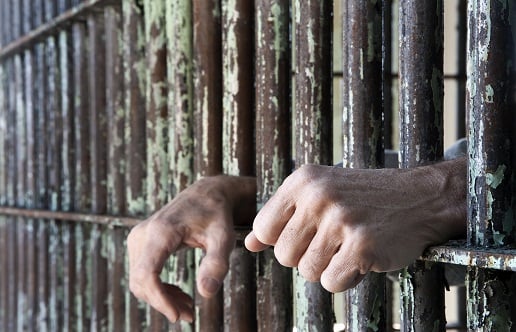Published on
The Case for Higher Education in Prisons

The following interview is with Rob Scott, director of the Prison Education Program at Cornell University. New York Governor Andrew Cuomo recently proposed expanding access to higher education for the state’s prisoners. Scott, who has been working in this field through his postsecondary career, discusses the philosophical and economic benefits of creating postsecondary access for individuals who are incarcerated.
1. What are some of the most common critiques raised about publically-funded prison higher education programs?
Some of the most common critiques raised about publically-funded prison higher education programs include the outrage some people feel when they hear that people who are incarnated are going to be getting an education ostensibly paid for with tax dollars while they, or maybe their children or people they know, are potentially taking out loans or at least spending money out-of-pocket to pay for their own education.
Another critique which is, in a sense, a little bit more blunt is simply that prison should not be for reforming people; its purpose is to punish people. We do call them corrections systems in the United States today, but there are many who take the view that that’s really sort of an archaism, that we don’t really do corrections anymore; it’s a thing of the past, and what we’re really about now is taking away a certain amount of time from people who have been convicted of certain classes of offences. … A lot of the prisons don’t have that many of those [rehabilitation] programs in them today, and that reflects that view.
2. From the philosophical perspective, what is the most significant advantage to universities creating access to higher education for prisoners?
In the United States, we’ve got about 2.5 million people in prison and 95 percent of those folks are coming home some day. About 93 percent of them are headed home within five years. While we think of them currently as prison inmates or criminals, they’re also citizens in our neighborhoods in the very relatively near future. From that perspective, it doesn’t make sense to treat them as such drastic ‘others’ that have nothing to do with us. … The question then becomes: “What is it we think we’re doing by putting people in prison for [a] determined amount of time and then returning them to our neighborhoods? What, as a society, do we want to be the consequence of this incarceration?”
If you put someone in prison for five years, what do you want to happen afterwards? Do you want them to come home educated? That’s where you have the question about whether or not you want higher education in there.
Do you want them to come home less educated because they’ve actually atrophied and they haven’t been able to use their minds in a productive way? Would you like them to come home mainly having associated with other people who see no hope in any sort of legitimate path in society and thus, effectively, it just brings them more criminality? Or would you like them to return home as people who have been working on a different narrative on their life, where they’ve been thinking about where they might have a career or at least a job in the legitimate economy, thus not being criminals anymore, not being prisoners anymore, but being citizens, being taxpayers and being contributors to the community.
3. Looking at the business case, is it in the university’s best financial interests to run these programs?
I think it’s in the whole economy’s best interest.
One of the core products of any economic system is the labor that is bought and sold to produce the goods and services created in the economy. A prison system exists as a black hole within the economy. Things go wrong and we ship people off to prisons where they are removed from society; they are removed from the economy, they’re not producing anything, they’re not paying taxes and thus they’re deprived of all of the liberties we are met with. But all their needs are met through tax dollars.
That includes tax dollars that would otherwise be able to go to our state university systems, which frequently complain of having strapped budgets. It includes those dollars which would otherwise go to other formats for public safety. … The case for higher education in prison is that, by reducing the scope of the prison system, we have more financial resources to address the other things we want to do.
When we think of the spending from the state on higher education in prison, we always have to [remember] that the major spending program is the prison system itself. … We’re spending $60,000 per head to do nothing with people but pile them in. The additional $5,000 that might be spent on certain individuals who are incarcerated in order to provide them with some college education is one-twelfth of what is otherwise spent to just make sure they’re locked in a prison somewhere.
4. How will the state economically benefit from the move that Gov. Andrew Cuomo has proposed?
We begin to have some sense of hope in the relationship citizens of New York have with respect to their society. It also really impacts very specific communities. The majority of people that end up in prison often come from very specific communities, largely in the inner cities and communities of color … There’s a loss of faith in the narrative of what we’re doing as a society when you see all of the men in the ages 20 to 40 removed from society, removed from being able to be parents, removed from being able to be contributors to the household economy. The chief contribution I see here is to push back on the “tough on crime” narrative, which has served to play a proxy to the criminalization of particular communities.
For your example, with the situation of state budgets and where dollars are allocated, a state like California is really in a bad spot because they’re spending more money right now in their prison system than they are on their state university system. The UCal system was their pride and joy for the whole country. They have UC Berkeley, they have UCLA … but they spend more money on putting people in prison right now. That’s where California’s at and they’re having a very hard time, even with the Supreme Court order against them reducing their numbers of people behind bars.
The college programs are … one of the only ways people who are going to experience all these disenfranchisements, or already have, can have a counter-narrative where they can … also say, I got an associate’s degree that I received while doing the time and serving the punishment. The time in there is the punishment, not a lifelong ban from all the civic functions that everyone else has.
5. Is there anything you’d like to add about the value of running prison education programs for universities and for society at large?
It’s a fantastic experience for everyone on the campus to go to the prison and teach. Most people misunderstand our programs, thinking of them as a charity service of some kind where we’re going to some underprivileged community in the prison and giving away a college education. In fact, if you listen to the rhetoric of our critics, it’s often put into those terms — as if education is this passive thing to put into the heads of a bunch of people in prison; they don’t do anything and then they just walk off with a degree paid for by the taxpayers. It is very hard to get into these programs in prison; people wait on the waiting list for over a year, they have to pass a Cornell University entrance exam and, once they’re in the program, it’s difficult to study. The cell houses are loud, calculators aren’t allowed [and] there’s all kinds of challenges that you don’t experience on campus. The consequence in university is when our professors, grads and post docs go in to teach, they find a set of students that are remarkably prepared, who bring no sense of entitlement to their classroom, who really see it as a privilege and a lucky turn of events that they’ve been able to have. … If universities aren’t about perpetuating already-existing privilege, but are about allowing the most active minds to seek out knowledge and to do with it what hadn’t been done before, then prison is an opportunity that is completely neglected at this point. … For me, that’s what has kept me in this project all this time — I’ve had the most inspiring classrooms I’ve participated in behind the walls of a prison.
Author Perspective: Administrator



